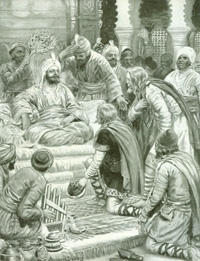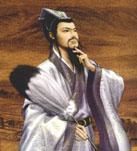

I came across the bottom image while searching for the top one.
The top image is an artist's impression of the 8th-9th century Caliph Harun al-Rashid receiving envoys from Charlemagne. Al-Rashid also maintained relations with the Tang Emperor at the other end of the Eurasian landmass, making Baghdad literally the centre of the civilised world.* I think the picture captures the relative positions of the West and Islam at the time - the primitiveness of dark age Europe compared with the refinement, wealth and power of the Muslim world.
The bottom image is of US marines conducting an airlift in Iraq. I think it expresses the contemporary relationship between the West and Islam, i.e. the latter's complete eclipse by the former: technologically, economically, militarily. I'm pretty sure these two juxtaposed images represent the context in which the occupation of Iraq and the broader 'War on Terror' is seen by Muslims round the world, a conclusion reinforced by discussions with Muslim friends. We are faced with a clash of civilisations, but one far more subtle than banalities about Islamo-fascists hating our way of life would suggest.
It's also a pictorial metaphor for one of the great questions of history, which I'll be exploring at length on this blog:
Why is it that among the world's civilisations, that which long seemed the least promising - what we call 'the West' - came eventually to build modernity and completely dominate the globe? (if you cringe at such cavalier use of the term 'modernity', rest assured I'll critique it in upcoming posts).
I say least promising because I'm treating 'the West' as a civilisation distinct from that of classical Greece and Rome, with its roots in the benighted Europe represented by the Frankish envoys in the picture. I'll be framing the discusison in terms of the debate between Eurocentrists, those who emphasise the uniqueness of 'western' civilisation, and anti-Eurocentrists, those who argue that the rise of the West was contingent - on timing, on geography, on the contributions of other cultures. My fascination with this question derives partly from my Chinese heritage (that of history's great second runner), partly from an academic interest that I sometimes have to remind myself isn't shared by everyone. But it does concern all of us, because the signs show that the age of western preeminence is passing. The defining phenomenon of the 21st century will not be terrorism but rather the rennaisance of non-western societies, which one can't comprehend without an understanding of how they fell so far behind in the first place.
History matters, people. And that's not self-justification for my Arts major. ;)
*Champions of New World civilisations will no doubt think that I'm a 'Eurasia-centrist'. Bear with me, I'll attend to the Americas in upcoming posts.

2 comments:
I'm looking forward to seeing where you go with this topic, John.
Just a quick point to consider, though - is the rise of East Asia (and hopefully the rest of the Non-West in time) really a 'non-Western renaissance', or is it merely an expansion of the West?
I should note that I haven't been to Asia, which warrants placing an asterisk against my opinion... but I get the impression that the modernisation of Asia has happened more as a result of adopting Western ideas. Their economies, for instance, have mostly focused on being the new manufacturing centres for the West. The political systems are, by and large, Western.
I can't comment with any confidence on the social and cultural aspects to Asian modernisation. This is the logical place to look for signs of a non-Western renaissance, I suppose. Do you have any plans to expand further upon this idea?
I realise that this was only a minor part of your post - but I thought I'd bring it up for further discussion.
I try to avoid using loaded terms like 'renaissance', but you tend to get lazy when blogging
what I'm trying to describe is the shift of global initiative, power and influence - economic, technical, intellectual, etc - back to the non-western world from the West, which has largely monoplised them for 150-200 years. Because of the West's dominance during the modern era, it has devleoped modern institutions (e.g. political and economic systems) and exported them to the non-western world. One must question however the extent to which such institutions are culturally grounded. For instance, many commercial institutions which we think of as 'western' - credit instruments, property rights, mass production etc - were invented in other cultures and in many cases borrowed by the west, which then devleoped them into their modern forms. This touches on a basic anti-Eurocentric argument: that the 'Rise of the West' was not achieved autonomously but relied heavily on the inputs of other civilisations. Thus the fact that the west has shaped the modern world doesn't necessarily imply that Asia's catch-up is simply an imitation of the West or an extension of its cultural power.
a good starting point for the debate about an Asian 'renaissance' is 'Can Asians Think', by Kishore Mahbubani (who happens to be speaking in Sydney this week). the book was first published in the early 1990's but was updated 3 years ago. HIs basic argument is that at the turn of the 21st century Asians have achieved political and (to some extent) economic emancipation from the West, but still need intellectual emanicpation before the era of western hegemony can truly be said to be passing.
Post a Comment